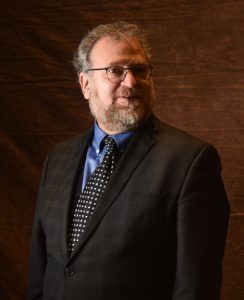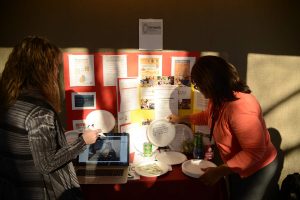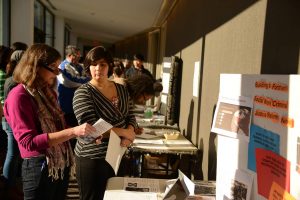Research from Saul Cornell, the Paul and Diane Guenther Chair in American History at Fordham, is included in the scholarship published Oct. 21 in the Fordham Urban Law Journal ahead of the scheduled oral arguments in United States v. Rahimi on Nov. 7. In the case, the court will decide whether a 30-year-old law banning firearms for people subject to domestic violence restraining orders violates the Second Amendment on its face.
Just over a year ago, the Supreme Court ruled in another case (NYSRPA v. Bruen) that gun regulations must reflect the ways such laws were applied at the time of the Second Amendment, which led the Fifth Circuit Court of Appeals to overturn the ban on domestic abusers.

Photo by Gina Vergel
“The Fifth Circuit said, well, domestic violence has been around for a long time. They didn’t take away people’s guns. Therefore, you can’t take away people’s guns.”
But Cornell argued there is a good reason why guns weren’t taken away in the 18th Century. “Although domestic violence is not new, at the time of the Second Amendment, domestic violence perpetrated with guns was just not an issue, because guns took too long to load and were not a good choice for impulsive acts of violence.”
“There’s a lot of complicated problems with how you would even begin to in good faith apply their method,” Cornell said. “There’s a huge opening for some kind of scholarship to give the court some direction,” Cornell said.
The published work includes statistical analyses, historical analyses such as Cornell’s, and descriptions of the ramifications of different legal decisions from some of today’s most influential experts in the fields of gun violence, public health, gun regulation, and the Second Amendment. These scholars author amicus briefs, which judges rely on for insight, and serve as expert witnesses in court.
The Fordham Urban Law Journal’s editor-in-chief, Joseph Gomez, said he expects their work to be used as source material when the justices write their opinions in Rahimi. “These scholars will be the most relevant source of expertise,” he said.
The field of weapons and gun law historians is small, and Cornell is in high demand as an expert witness in firearms regulation cases across the country. He said he currently is involved in 20 active cases ranging from extreme risk protection order decisions to whether people applying to be foster parents should have to lock up their weapons.
Confusion Over Bruen
“I’ve been working on gun regulation and the Second Amendment now since 1999,” said Cornell. “And because the Supreme Court last year issued this opinion that has created chaos in the lower courts, New York State Rifle and Pistol Association Inc. versus Bruen, it was clear to me and lots of people I talked to that since they changed the framework for evaluating laws, nobody knows how to implement the framework.”
Before the Bruen decision in 2022, lower courts looked to both historical tradition of gun regulation and “important government interest,” such as public safety considerations, he said. But in the Bruen decision, the Supreme Court said public safety can only be considered if there were comparable laws at the time of the Second Amendment that took public safety into account. Cornell said this “basically means you either have to find an analogous law, or at least a tradition, that seems to resemble the law in question today. And the big problem is life was very different in the 18th Century.”
Lower courts must rely on the Supreme Court’s guidance when interpreting gun laws. The pending Rahimi case provides the court with an opportunity to clarify how lower courts should apply the new framework laid out in Bruen, according to Kelly Roskam, J.D., the director of law and policy at the Johns Hopkins Center for Gun Violence Solutions, who participated in the scholarship as well as the 2023 Cooper-Walsh Colloquium on “Public Health, History, and the Future of Gun Regulation After Bruen” that Cornell helped organize at the Fordham School of Law on Oct. 13.
The Fordham Urban Law Journal, Northwell Health Center for Gun Violence Prevention, and the Johns Hopkins Bloomberg School of Public Health Center for Gun Violence Solutions co-hosted the event.
‘Not Usually How We Do Things’
Cornell said, “I know a lot of people in the gun violence prevention community, and many of them were concerned that if history is what’s going to drive [the decision], does that mean all this great research we do about what actually is the problem and what is the solution is now irrelevant? It would be kind of crazy that they would just rely on what was known back then. I mean, that’s usually not how we do things.”
The Supreme Court is expected to announce its decision next June.
]]>According to Saul Cornell, Ph.D., that’s the lesson of a decision last month by the Ninth Circuit of the U.S. Court of Appeals that ruled in favor of states limiting who can carry a gun in public.

Cornell, the Paul and Diane Guenther Chair in American History, was cited multiple times by both the majority and dissenting opinions in the decision Young V. State of Hawaii. The justices in the case based their decision partly on his research on the models of gun regulation that were developed in the United States outside of the Slave South.
Rather than relying on the words of slave-owning judges in the antebellum South to guide their understanding of history, Cornell’s approach urges judges to take into account the history of all parts of the country when using the past as precedent.
The case began when George Young sued the state of Hawaii in 2012 for denying his application to carry a concealed or openly visible handgun. Hawaii law stipulates that the police chief may only grant such licenses to those who need a gun for their job or who show “reason to fear injury” to their “person or property.”
Young claimed this violated the 2008 Supreme Court decision Heller vs. District of Columbia, which was the first Supreme Court case to decide that the Second Amendment protects an individual right to keep and bear arms for self-defense, and that was not just a right intended for state militias.
There is a catch though. When he wrote the Heller majority opinion, the late Antonin Scalia, a proponent of the legal theory originalism, cited the 1846 case Nunn vs. Georgia, which interpreted the right to bear arms in expansive terms.
Proponents of originalism assert that the Constitution must be interpreted based on the original understanding “at the time it was adopted.”
But since the Nunn case was a product of the Slave South, and not the era when the Second Amendment was written, courts have since 2008 been considering whether it represented the attitudes of a majority of the country or just one region. Once Scalia linked the constitutionality of today’s laws to establishing a historical genealogy, it set off a legal scavenger hunt of sorts for scholars like Cornell, who first tackled the issue of the history of regional differences in A Well Regulated Right: The Early American Origins of Gun Control (Fordham Law Review, 2004).
Regional Gun Cultures
“Since Heller, we now ask not just ‘What is the history of the right to bear arms?’ but ‘What is the history of regulation?’ And when you start doing the history, what you discover is, America was a very complicated place even back in its early history,” he said.
“One of the most interesting and important qualities of America then that still exists today is the existence of regional gun cultures.”
Working with colleagues at places such as the Duke University Center for Firearms Law, Cornell has been excavating that history, most recently in History, Text, Tradition, and the Future of Second Amendment Jurisprudence: Limits on Armed Travel under Anglo-American Law, 1688–1868, 83 (Law and Contemporary Problems, 2020). It was one of the sources cited in the Young case, which runs to 215 pages and traces the arc of gun regulation over five centuries from English common law, which is the basis of much of American law, and has profoundly shaped today’s law.
“Heller stuck very close to a narrow range of sources, mostly case law. What Young did is, it took Heller’s injunction to look at the history of regulations as guideposts for judging,” Cornell said.
“It turns out the history is much more friendly to regulation than Scalia or gun rights activists would have imagined.”
In addition to finding clear examples of regulations in England before the American Revolution, Cornell found statutes in Massachusetts that prohibited “armed travel in populous areas.”
The irony, Cornell said, is that Scalia just assumed that the gun regulation laws in the slave-holding South would evolve in the same way as New England or the Midwest, where Cornell found examples of gun regulations from the 19th century. Originalists, including Justice Scalia, were so confident that the precedent set by the South would be commonplace, and history would bear out their view, they never bothered to consider other examples from different regions.
“I think what we’ve seen time and again since Heller—and it’s really quite striking—is that almost all the serious historical scholarship has found that Heller’s history is just demonstrably false in important ways.” he said.
“The authors of Heller went big on the history, but never anticipated or thought, ‘What happens if the history doesn’t support us?’ They were completely naïve because their view of history was just so simplistic. They really don’t think history changes, and that’s the essence of their originalism.”
Historical Precedent for Providing a Reason for Gun Ownership
Ultimately, Cornell said decisions such as Young show that if activists’ goal is to let any American buy a gun and carry it without a good reason, history will not be as helpful as they assume. The attitudes that Southerners had about guns were not representative of the whole country in the 19th century, and that remains true today.
“One of the funny things about modern gun debate is, gun rights activists say that asking someone to provide a reason to own a gun is unreasonable. But it turns out have having a reason has always been reasonable in most places in America.”
]]>
At a poster session on Dec. 16 at Fordham’s Westchester campus, students from
Fordham’s Graduate School of Social Service presented information and petitions for topics they hope to change—from the DREAM Act and legalized prostitution to geriatric prison reform and Native American rights.
Jonathan Wilson and three other classmates made their case for changing the narrative around guns, from one of control to one of safety.
“The problem is the rhetoric of gun control and Second Amendment rights that is always brought up when commonsense gun laws are brought to the table,” he said.
The group wore shirts with the phrase “Locked and Unloaded,” to call attention to Nicholas’s Law, which was passed in June by the New York State Assembly and is under consideration by the New York State Senate. It’s named for Nicholas Naumkin, a 12-year-old boy from the town of Wilton who was killed by a friend who used his father’s loaded handgun.
“There really was no penalty for the parent, so this is about making it stricter so the law gets enforced. You can have a gun in your home, but we want it locked and unloaded when it’s not in your possession,” said Wilson, whose own half-sister accidentally killed herself with her parents’ gun when he was 7.

Karen Zokas, whose group focused on food insecurity, solicited donations for the Westchester Food Bank, and invited people to write on paper plates what it meant to them to be hungry. The issue, she said, is relevant to clinical social work that she plans to practice upon graduation, because if people are hungry it’s impossible to think about their own mental health. And it’s a lot more widespread than people might think.
“Twenty-thousand children under the age of 5 are passing away in this country because they don’t have enough nutrients. That’s a lot,” she said.
Even wealthy Westchester County is not immune. Fellow classmate Samantha Leushner noted that research has found that one out of five residents is hungry there.
“You have to focus on that word ‘hungry.’ Its not just food insecurity, but literally [that]you’re going to bed and your stomach is rumbling and you might feel nauseous,” she said.
A group focused on criminal justice reform named itself the Fordham Social Work Criminal Justice Network. The group has established partnerships with the Neighborhood Defender Service of Harlem and the Center for NuLeadership on Urban Solutions.
Member Gretta Heaney said she was shocked and ashamed at how ignorant she was about the subject before she came to Fordham. Books such as Michelle Alexander’s The New Jim Crow (The New Press, 2010) inspired her to take action.
“For many of us who care about social justice, there’s a lot we don’t know about. There’s a lot of ignorance about how the system works—the suffering, the discriminatory policies,” she said.

“I was just oblivious to it. So it’s a real raising of consciousness.”
All the students are enrolled in the class Social Policy II: Policy Practice and Human Rights Advocacy. Marciana Popescu, PhD, associate professor of social work, one of three faculty members teaching it, said the fair exemplified raising awareness and developing networks beyond the classroom.
“They get to experience what it means to be an advocate, and they also learn how to present their work shortly, concisely,” she said.
“You only have a few minutes when people stop by your table. How can you maximize your time to say ‘This is the issue,’ and ‘This is why you should sign.’ That’s part of their professional development.”
]]>As Joseph M. McShane, S.J., president of Fordham, bid farewell to students leaving for the 2012 holiday break, he said that we would normally celebrate this time of year with great joy, “but not this year.”
The event galvanized a nationwide debate on guns, as gun control advocates seized the moment to reframe the conversation and gun advocates reasserted their right to bear arms. National attention on the issue waned as the year’s news cycle played out and a congressional law that would have expanded background checks was defeated in the spring.
In light of the tragedy, vigorous communities of both pro- and anti-gun advocates have sprung up online in whatSaul Cornell, Ph.D., the Paul and Diane Guenther Chair in American History and leading expert on the Second Amendment, calls “a new sphere of cyberspace where they can continue to advocate.”
On Jan. 21, Fordham will get involved in the conversation when University departments and offices sponsor a conference, “The Future of Commonsense Gun Regulation: Where do We Go From Here?”
Cornell will moderate the session of panelists who include:
• Robert Spitzer, Ph.D., distinguished distinguished service professor and chair of political science at SUNY Cortland, a leading authority on the politics of gun control, the presidency, and Congress.
• Kristin A. Goss, Ph.D., associate professor of public policy and political science at Duke University, an expert on the gun control movement, woman’s political activism, and philanthropy.
This session will take stock of the current situation and offer some insight into the future of the gun debate in America. The event will be live tweeted from @fordhamnotes using the hashtag #gunsense.
“It’s been about a year and legislation is stalled at the federal level. It’s all too predictable at the state level, where states with high gun controls got tighter restrictions, but states with high gun controls got more lax,” said Cornell. “The problem is that in a nation where there’s not a unified gun market, what is politically feasible? What are the options, and what need to be done?”
The event is sponsored by the Department of History, Office of the Provost, Office of the Dean of Faculty of Arts & Sciences, and Dean of Fordham College Rose Hill.
For more information contact Kirsten Swinth, Ph.D. at [email protected].
— Tom Stoelker
]]>